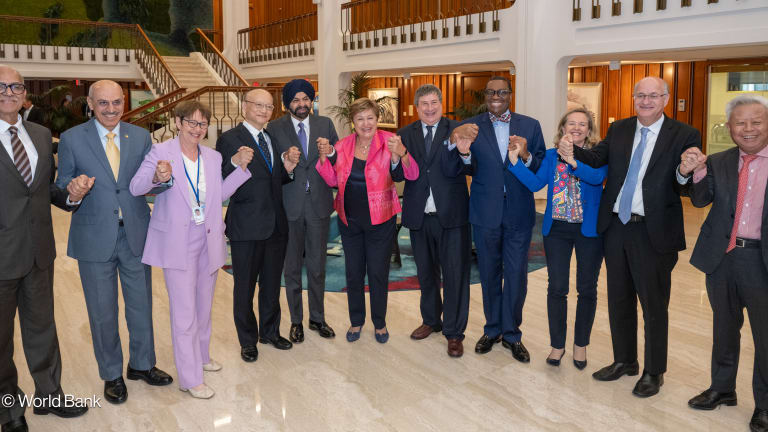
There's only a drop of life left in Lebanon's water sector before it reaches breaking point. With more than 80% of the population under the poverty line, people across the country are increasingly looting water pipes and cables to resell them for cash to feed their families. Conflicts over water are increasing, with some incidents escalating violently.
As state institutions disintegrate, international aid organizations must act fast but with great caution. Band-Aid solutions — such as relying on the water trucking mafia — will make it far worse in the long run. How international NGOs respond to today’s water crisis in Lebanon could later impede the state’s ability to provide essential water services, at a cost to Lebanon’s most vulnerable. To avoid millions going thirsty, innovative solutions are desperately needed. Enlisting municipalities as allies could play a vital role in addressing Lebanon’s water crisis.
A faltering water sector
Even before Lebanon’s financial crash, the country faced ongoing water shortages for years due to the water sector’s disastrous management. The arrival of 1.5 million Syrian refugees in Lebanon since 2011 has also burdened the country’s water supply and services. The unprecedented economic crisis since 2019 — which the World Bank considers one of the worst globally since the 1850s — has exacerbated many challenges and risks.
Today, the four regional establishments — North, South, Bekaa, and Beirut — in charge of vital public water services are grinding to a halt. Due to the dramatic devaluation of the local currency, these public water institutions can no longer sustain their water infrastructure or services. With no cost-recovery, these entities have no money to pay for the fuel they rely on to run their water pumps nor to pay their staff’s salaries — with the minimum salary now worth about $17 per month.
These days, the offices of the public water institutions are mostly empty because employees cannot afford to fill their car tanks to come to work and have lost motivation. They either don’t work at all or only for a few hours a week. Water leaks and losses caused by nonrevenue water — produced but “lost” water — only add to the woes. Much of the population is now at severe risk of water shortages and scarcity.
Risky power shift
To avoid a catastrophe, international donors swiftly stepped in. In the past decade, donors focused on providing water to informal tent settlements in which many Syrian refugees reside, as these settlements are not connected to public water services. Today, the limelight is on the country’s public water establishments. Donors simply cannot afford their collapse.
To ensure these establishments stay afloat, international donors and embassies have invested heavily into building the public institutions’ capacity and ensuring their infrastructure keeps running.
However, this situation has enabled the crumbling Lebanese state and the Ministry of Energy and Water to gradually wash their hands of the water sector by handing it over to donors, as shown by politicians’ lack of will to prioritize water on the national agenda.
The future of Lebanon’s water sector is now virtually in the hands of a handful of international aid organizations battling to navigate a complex context in which no one can afford to pay for water anymore.
A missing ally
In its fight to provide equal water access to all, the international development community has so far mostly failed to enlist a vital ally: the country’s municipalities. Yet, some of Lebanon’s municipalities can be quickly mobilized and can play an essential role in water-related issues as middle agents between local communities and public water establishments. Some already do, but in a mismatched manner.
These decentralized authorities know their locality inside-out and could help engage the community, help operate water supply systems and make them more efficient, and mediate and resolve water conflicts. Bulk metering at the municipal level could even connect slum areas to water establishments. For example, UNICEF recently tried a similar approach in a pilot project in Dahieh, in the southern suburbs of Beirut; yet it is still too early to see how this could be applied nationally. It remains a legally gray area.
To use a localized approach, Lebanon first needs an urgent revamping of its institutional framework to clarify and regulate municipalities’ roles and responsibilities in the water sector. Donors must continue pushing for reforms anchored in a human rights-based approach, through inclusive working groups that engage relevant stakeholders, especially municipalities.
Meanwhile, international organizations also need to watch out for increasing corruption and rampant political interference across the water sector by taking a close look at each local area’s political economy and contextualizing their response accordingly.
Lebanon’s lesson
While Lebanon continues to hurtle toward becoming a “failed state,” there are key lessons that the broader global development community can learn from it. International aid organizations can play a leading role in helping strengthen public water services and infrastructure for the future. But it must be done with great caution.
While managing the country’s water supply needs to be centralized, its water services need buy-in from local groups, such as municipalities, and even more so during institutional collapse. A human rights-based approach can only be applied by carefully studying each local context’s political economy to avoid doing more harm in the long run.
In Lebanon, now is the time for international aid organizations to set the example and work innovatively together before the country’s taps dry up.








